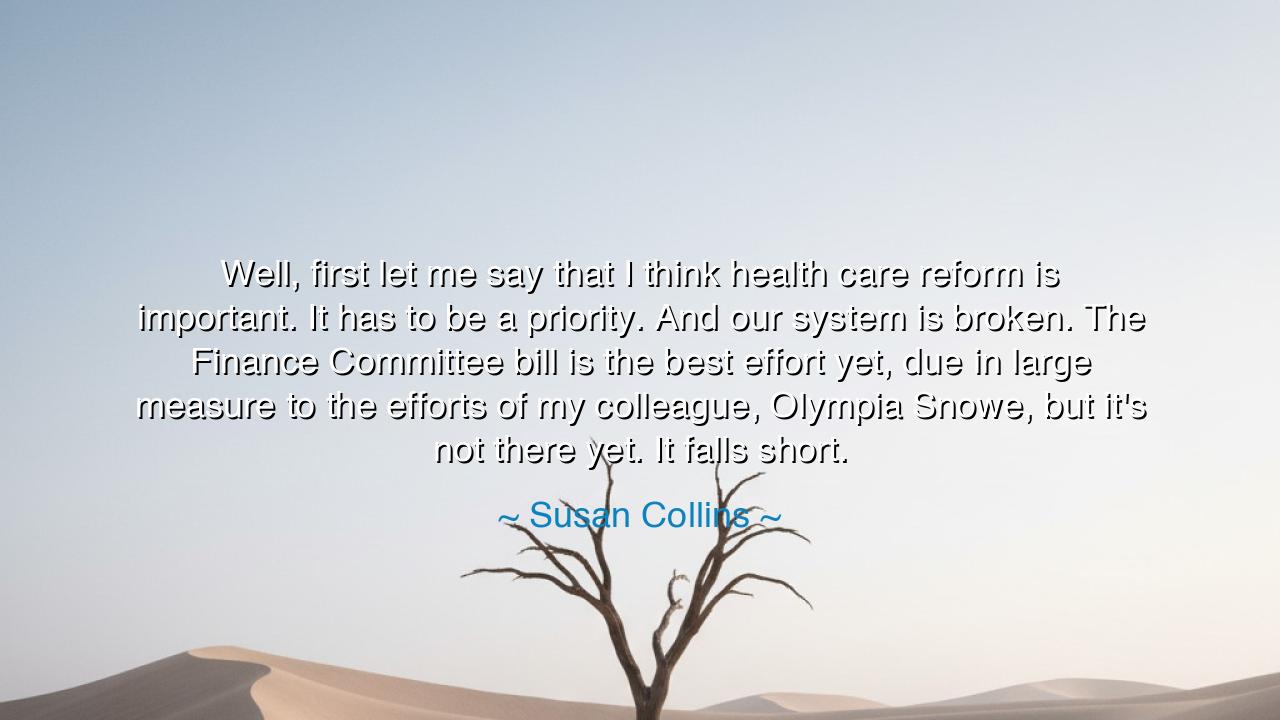
Well, first let me say that I think health care reform is
Well, first let me say that I think health care reform is important. It has to be a priority. And our system is broken. The Finance Committee bill is the best effort yet, due in large measure to the efforts of my colleague, Olympia Snowe, but it's not there yet. It falls short.






In the solemn voice of Susan Collins, we hear not merely the speech of a stateswoman, but the cry of conscience that echoes through the chambers of human responsibility: “Well, first let me say that I think health care reform is important. It has to be a priority. And our system is broken. The Finance Committee bill is the best effort yet, due in large measure to the efforts of my colleague, Olympia Snowe, but it's not there yet. It falls short.” These words are not of triumph, but of vigilance — a reminder that even the noblest efforts of humankind often arrive unfinished, and that the duty of a just people is not to grow weary in the pursuit of what is right.
The ancients would have understood her lament, for they too knew that the work of healing — of body, of spirit, of society — is never done in a single generation. In every age, there arise voices that call for renewal, for reform, for compassion woven into the fabric of law. When Collins speaks of a broken system, she names the truth that civilizations, like men, may fall ill — not by the hand of plague or war alone, but through the slow erosion of justice, when wealth and power grow fat while mercy starves. To call for reform, then, is not to scorn the past, but to heal it; not to destroy what is built, but to make it whole.
Her words came from a time of fierce debate in the halls of American governance, when the nation wrestled with its conscience over health care reform. Yet her tone was neither of rage nor surrender. Instead, she spoke as one who sees both the light and the shadow — who knows that even when progress comes, it must be tempered by humility, for no law, no policy, no bill can capture the full measure of human need. The Finance Committee’s effort, she said, was “the best yet” — a phrase that honors struggle while confessing imperfection. Here lies the timeless wisdom: that the best effort of one season may yet fall short of the justice demanded by eternity.
Let us recall the story of Hippocrates, the ancient physician of Kos. He walked among the sick not with promises of perfection, but with the oath of compassion: to do no harm, to strive always for the patient’s good. His art was not flawless; he could not banish death, nor cure all suffering. Yet through his devotion, medicine became a sacred trust between healer and healed. So too, in the governance of nations, must leaders bear that same oath — to seek the health of the people, to mend what is broken even when the cure is incomplete. It is this spirit that breathes through Collins’s words: the recognition that imperfection is not failure, but an invitation to persevere.
In truth, the call for reform is as old as civilization itself. The prophets of Israel cried out for justice for the poor and the wounded; the philosophers of Athens debated the ideal polis; the framers of constitutions dreamed of societies built not upon privilege, but upon care for one another. Yet every reformer faces the same truth: that progress is a journey, not an event. The mountain of equity must be climbed step by step, bill by bill, act by act, until at last the summit of compassion is reached.
The lesson of Susan Collins’s words is therefore both simple and profound. It teaches us that to strive for good, even when the goal is distant, is the mark of courage. To admit that something “falls short” is not weakness — it is the honesty of one who loves truth more than pride. We, too, must learn this humility: to labor earnestly for improvement, to honor the efforts of others, and yet to hold steadfast to the vision of a more perfect whole.
So let every listener take this wisdom into their heart. When you see a system — in your nation, your community, your own life — that is broken, do not turn away in despair. Speak as Collins spoke: with respect for what has been done, and courage to name what remains undone. Reform is not the work of anger, but of love. And love, like healing, demands both patience and persistence. Let us then be healers — of our bodies, our institutions, and our spirits — until the day when our efforts, though imperfect, stand as monuments to our care for one another. For only then shall the broken system be made whole, not by decree, but by devotion.






AAdministratorAdministrator
Welcome, honored guests. Please leave a comment, we will respond soon